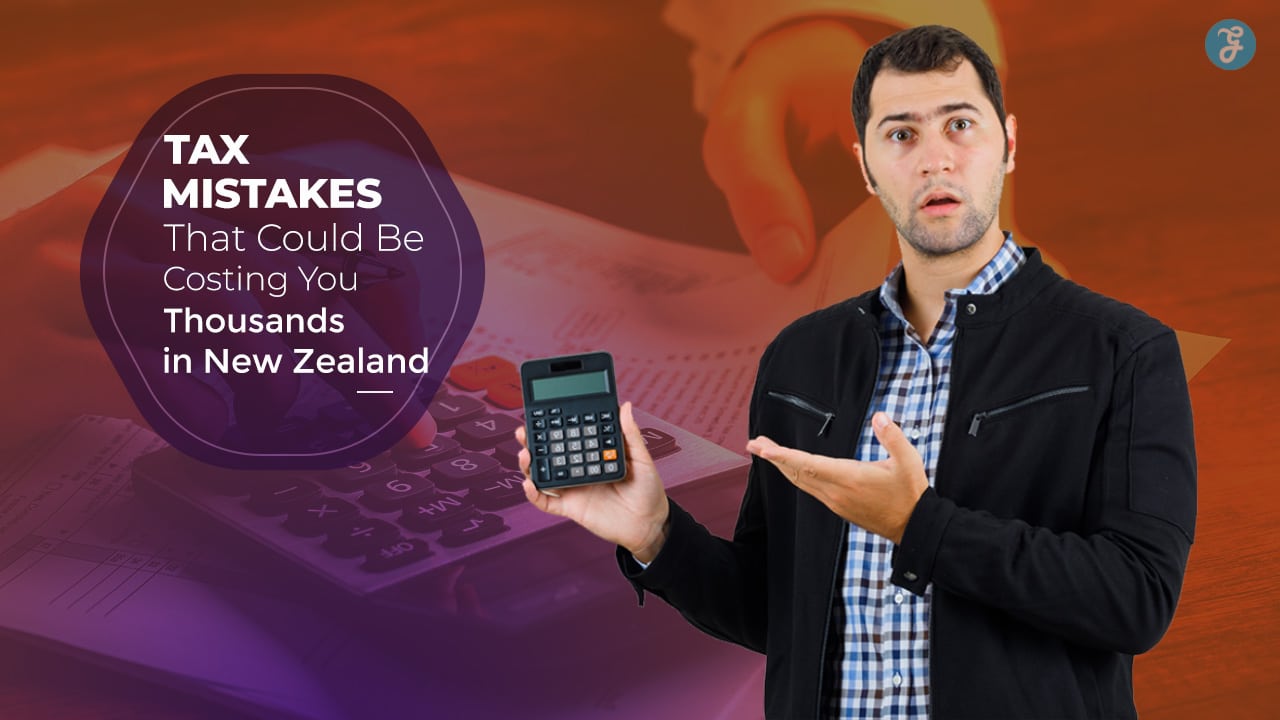Paying taxes is a necessary part of life, but making mistakes on your tax returns can lead to significant financial losses. In New Zealand, the Inland Revenue Department (IRD) enforces strict regulations to ensure taxpayers meet their obligations.
Unfortunately, many individuals and businesses unknowingly make tax mistakes that cost them thousands of dollars annually. These errors can range from missing deductions and failing to declare income to mismanaging GST and filing late returns.
This article delves into 10 common tax mistakes made by taxpayers in New Zealand and provides actionable steps to avoid them. By implementing these strategies, you can reduce tax liabilities, stay compliant, and maximize your savings.
1. Failing to Declare All Income
One of the most common and costly mistakes taxpayers make in New Zealand is failing to declare all sources of income. Whether it’s rental income, dividends, foreign earnings, or income from side gigs, the IRD requires that all income is reported.
Some people mistakenly believe that small amounts, such as occasional freelance work or casual Airbnb rentals, do not need to be declared.
However, even these minor amounts are taxable, and failing to disclose them can lead to penalties or audits. Moreover, with technological advancements, the IRD now has access to more data, making it easier to track unreported income.
| Income Type | Examples |
| Rental Income | Airbnb, long-term rentals |
| Dividends | Income from shares or investments |
| Freelance Income | Contract work, part-time side hustles |
| Foreign Earnings | Income from overseas businesses or jobs |
How to Avoid This Mistake:
- Keep a detailed record of all income streams using accounting software or spreadsheets.
- Reconcile income reports with bank statements to ensure nothing is missed.
- Consult a tax professional if you have complex income sources, such as foreign earnings.
2. Missing Out on Eligible Deductions
Tax deductions are a powerful way to reduce taxable income, but many taxpayers either overlook or underutilize them. Common deductible expenses include home office costs, business-related travel, utilities, and professional development.
For example, if you work from home, you can claim a percentage of your electricity and internet bills. Businesses can deduct expenses for marketing, repairs, and even employee training.
Ignoring these deductions means you’re paying more tax than necessary. Additionally, many are unaware that charitable donations are also tax-deductible, offering another opportunity for savings.
| Deduction Type | Examples |
| Home Office Expenses | Rent, electricity, internet |
| Business Expenses | Repairs, travel, advertising |
| Charitable Donations | Approved charitable contributions |
How to Avoid This Mistake:
- Use receipt-scanning apps or accounting software to track deductible expenses.
- Understand what qualifies as a deductible expense under IRD rules.
- Consult a tax advisor to uncover all potential deductions relevant to your situation.
3. Incorrectly Claiming GST Refunds
Claiming Goods and Services Tax (GST) refunds can be complicated, and mistakes are common. Issues arise when taxpayers claim GST on personal expenses or fail to adjust for private use of business assets, such as vehicles or equipment.
Additionally, failing to maintain proper records for GST-related transactions can lead to inaccuracies. The IRD closely monitors GST refunds, and any discrepancies can result in penalties, audits, or delayed refunds.
Correctly claiming GST requires a thorough understanding of what qualifies as a business expense and meticulous record-keeping.
| GST Claim Error | Impact |
| Claiming Personal Expenses | Penalties for incorrect claims |
| Ignoring Private Use of Assets | Overstated GST refunds |
| Poor Record-Keeping | Risk of audits or delayed refunds |
How to Avoid This Mistake:
- Maintain separate bank accounts for business and personal transactions.
- Use accounting software like Xero to automate GST calculations.
- Review GST returns before submission to ensure accuracy.
4. Not Keeping Accurate Records
Keeping accurate financial records is essential for tax compliance in New Zealand. Whether it’s receipts, invoices, or bank statements, poor record-keeping can result in errors on your tax returns.
The IRD requires businesses and individuals to retain records for at least seven years, and failing to do so can lead to penalties during an audit.
For example, if you cannot provide evidence for a claimed deduction, the IRD may disallow it. Organized records not only ensure compliance but also make it easier to identify deductions and prepare accurate returns.
| Record Type | Examples |
| Receipts | Business expenses, charitable donations |
| Invoices | Payments from clients |
| Bank Statements | Proof of transactions |
How to Avoid This Mistake:
- Invest in cloud-based accounting tools to store and organize records.
- Set up a filing system for physical and digital records.
- Conduct regular record audits to ensure nothing is missing.
5. Failing to Meet Filing Deadlines
Tax filing deadlines in New Zealand vary depending on the type of tax and whether you’re an individual or business. Missing these deadlines can result in penalties, interest charges, and increased scrutiny from the IRD.
For instance, income tax returns for individuals are generally due by 7th July, while GST returns may need to be filed monthly, bi-monthly, or quarterly. Provisional taxpayers have additional payment deadlines to meet throughout the year.
Proper planning and calendar reminders can help you avoid the stress and financial burden of late submissions.
| Tax Type | Filing Deadline |
| Income Tax | 7th July (unless extension granted) |
| GST | Varies (monthly or bi-monthly) |
| Provisional Tax | Based on IRD-specified dates |
How to Avoid This Mistake:
- Mark all filing deadlines on a calendar or set reminders.
- Hire an accountant to ensure timely submissions.
- Apply for an extension if you’re unable to meet a deadline.
6. Overlooking Tax Obligations for Side Hustles
With the growing gig economy, more people in New Zealand are earning additional income through side hustles. However, many fail to declare this income, assuming it’s exempt from taxation. Whether you’re freelancing, selling goods online, or driving for ride-sharing apps, the IRD requires all income to be reported.
Side hustle income may also trigger GST obligations if earnings exceed the $60,000 threshold annually. Not reporting this income can result in penalties and backdated taxes.
| Side Hustle Type | Tax Implications |
| Freelancing | Income tax and possible GST registration |
| Online Sales | Taxable if conducted as a business |
| Ride-Sharing Services | Taxable income, GST obligations |
How to Avoid This Mistake:
- Track all side hustle earnings and expenses separately.
- Use accounting software to calculate and file taxes.
- Consult with a tax professional to ensure compliance.
7. Misclassifying Employees as Contractors
Misclassifying employees as contractors is a common mistake among businesses in New Zealand. This error often arises from a misunderstanding of tax obligations and employment laws. Employees and contractors have different tax requirements.
While contractors manage their taxes independently, employers must deduct PAYE (Pay As You Earn) tax, KiwiSaver contributions, and provide leave entitlements for employees. Misclassifications can lead to back taxes, penalties, and even legal action.
The IRD is strict about ensuring that employers correctly classify their workers, so it’s essential to understand the distinction.
| Classification | Employer Responsibility |
| Employee | PAYE, KiwiSaver, leave entitlements |
| Contractor | No PAYE; responsible for their own taxes |
How to Avoid This Mistake:
- Review the IRD’s criteria for determining employment status.
- Draft clear contracts that outline worker relationships.
- Seek legal or tax advice to ensure compliance with employment laws.
8. Not Understanding Depreciation Rules
Depreciation is a critical aspect of managing assets in your business or rental property, but many taxpayers fail to understand how it works.
Depreciation allows you to claim a tax deduction for the decline in value of certain assets over time, such as vehicles, machinery, and office equipment.
However, applying the wrong depreciation rates or failing to claim depreciation altogether can result in lost tax savings. The IRD provides a detailed schedule with rates for different asset categories.
Not understanding or using these rates properly can lead to underclaimed deductions or compliance issues.
| Asset Type | Depreciation Rate |
| Office Equipment | 50% declining value |
| Vehicles | 30% declining value |
| Rental Property Appliances | Specific rates based on asset life |
How to Avoid This Mistake:
- Consult the IRD’s depreciation schedule for accurate rates.
- Use accounting software to calculate and apply depreciation automatically.
- Work with an accountant to ensure compliance with depreciation rules.
9. Ignoring Tax Obligations for Overseas Income
If you earn income from overseas sources, such as investments, pensions, or rental properties, you are required to report it to the IRD.
Many taxpayers mistakenly assume that foreign income is exempt from New Zealand taxes, especially if it has already been taxed abroad. However, New Zealand has double taxation agreements (DTAs) with many countries, which can help reduce your tax liability.
Failure to disclose foreign income can result in significant penalties and interest charges. With the IRD’s increasing access to global financial data, it’s more important than ever to comply with overseas income reporting requirements.
| Income Source | Examples |
| Investments | Dividends, interest |
| Pensions | Overseas retirement income |
| Rental Properties | Foreign property rental earnings |
How to Avoid This Mistake:
- Consult a tax advisor with expertise in international taxation.
- Familiarize yourself with New Zealand’s DTAs to avoid double taxation.
- Use accounting software that supports multi-currency transactions.
10. Failing to Seek Professional Advice
Navigating the complexities of New Zealand’s tax system can be challenging, especially for individuals with multiple income streams or businesses with diverse operations.
Attempting to manage taxes on your own often leads to costly errors, missed deductions, and compliance issues. Hiring a qualified tax advisor or accountant can help you identify opportunities for savings, ensure accuracy in your filings, and provide peace of mind.
While professional advice comes with a cost, the long-term savings and reduced risk of penalties far outweigh the expense.
| Benefit of Professional Advice | Impact |
| Maximized Deductions | Increased savings |
| Compliance with Tax Laws | Reduced risk of penalties |
| Time Efficiency | Focus on business or personal priorities |
How to Avoid This Mistake:
- Schedule annual consultations with a certified tax advisor.
- Use tax professionals who specialize in your specific industry or income type.
- Review your tax returns annually with a professional to identify missed opportunities.
Takeaway
Tax mistakes can cost New Zealand taxpayers thousands of dollars each year, but they are avoidable with the right knowledge and preparation. From failing to declare all income and mismanaging GST to overlooking overseas income and missing out on deductions, these errors can add up quickly.
Understanding these common pitfalls and implementing the recommended solutions can help you reduce your tax liability, stay compliant with IRD regulations, and keep more money in your pocket.
To ensure maximum savings and compliance, it’s always a good idea to seek professional advice. A qualified accountant or tax advisor can help you navigate complex tax rules, uncover potential savings, and give you peace of mind.
Take charge of your tax obligations today and avoid the costly mistakes that so many others make. Let this guide be your first step toward smarter and more efficient tax management in New Zealand.








































